- Home
- James Swain
Shadow People Page 7
Shadow People Read online
Page 7
The breath caught in Munns’s throat. Becoming a member of the Order had given his life purpose, and made him strong. He could only imagine what his new role would be like.
“I won’t let you down,” Munns promised.
“Glad to hear it,” the body artist said.
11
It was a damp and dreary Saturday afternoon. But that hadn’t stopped six hundred happy kids from Fort Apache, the Bronx, from showing up for today’s matinee. The kids came from poor families, and could not have afforded the price of a ticket, much less the cost of a bus ride and box lunch. Nor did they have to. Peter picked up the tab.
It was a practice he’d started when he’d first opened his theater. Performing for adults paid the bills, but performing for kids was what he loved. There were a lot of kids in New York who couldn’t afford to come to his show. So every Saturday, he opened his doors, and invited a group of them in.
He couldn’t have pulled it off without Liza’s help. His show was staged in an old sausage plant in the meatpacking district, the building cold and a little spooky. That was fine for adults who came to his evening shows, but not for the little ones. To make the place more appealing, Liza strung papier-mâché streamers on the walls and cheerful orange rugs on the cold tile floors. She also changed the preshow music from a moody piano concerto to a cheerful song by the Muppets. Upon entering the theater, the kids were greeted by a pair of old-fashioned popcorn machines, and carts filled with free drinks.
The show Peter performed on Saturday afternoons was also different. Gone were his mind-boggling illusions and baffling mind-reading stunts. Instead, he did his kid show, and performed the Multiplying Bottles, Sucker Die Box, the Professor’s Nightmare, Eggs from the Mouth, Rabbit out of the Hat, and a dozen other timeless routines. They were tricks designed to make kids scream with delight. That was what his Saturday show was all about.
Peter was in his dressing room getting ready. He wore a tailored Italian jacket, the pockets of which he now checked. The two normal pockets on the outside contained a deck of cards and a set of multiplying billiard balls, while the four secret pockets sewn into the lining contained a reel, a thumb tip, a hand flasher that sent a burst of flash paper into the air, and a trick scarf that changed colors just by flicking it in the air. Everything was where it should be, and he turned to his guest.
“You done yet?” he asked.
“I’m getting there,” the FBI artist replied, sketching away.
“I don’t mean to be rude, but I have a show to do.”
“One minute.”
“One minute I can do.”
Special Agent Roe had come to the theater by himself, and set up shop in the dressing room with his sketch pad and charcoal pencils. Garrison was not present, and Peter guessed the FBI agent had been pulled away on another assignment.
“Here, tell me what you think.” Roe turned his pad around for Peter to see the composite of Dr. Death he’d drawn. It was good, but not good enough.
“Wow,” Peter said.
“You like it?”
“It’s great, but it’s missing something.”
“What’s that?”
“His inner rage.”
Roe frowned. “You said he was the quiet type. That’s what I drew.”
“He’s carrying around a lot of anger. The volcano inside of him could erupt at any moment.” Peter snapped his fingers for effect. “Just like that.”
“What are you, a profiler?”
The truth be known, he could have been a detective or maybe even a profiler; his ability to look at people and gauge their feelings was as good as his ability to read minds.
“I’m open to suggestions,” Roe said, breaking the silence.
“Can I take a closer look?”
Roe handed him the sketch pad. Dr. Death had the kind of face that was easily lost in a crowd. If Roe didn’t capture his inner rage, there was a chance the killer would continue to elude the FBI, and an innocent woman named Rachael would perish this Friday night. Peter couldn’t let that happen. He was going to open up with Roe, and decided the trade was worth it.
“Our killer has entered into a pact with the Devil. You need to capture that in your drawing.”
“Are you serious?”
“Dead serious. Pardon the pun.”
“But how could you possibly know that?”
“How much did Garrison tell you about me?”
“He said you did magic, and that if I wasn’t careful, you’d read my mind. I assumed he was pulling my leg.” Roe paused. “Can you read minds?”
“I sure can. I read the killer’s mind. That’s how I know these things about him.”
Roe chuckled under his breath. It was how most people reacted when confronted by something out of the realm of their comprehension. Only this situation wasn’t humorous, and Peter realized he needed to make Roe understand.
Peter stared into the FBI agent’s eyes, and plumbed his thoughts. He saw Roe enjoying a candlelight dinner with an elegant young woman. The restaurant had polished wood floors and smokey etched glass that separated the tables. It looked like the Grotta Azzurra in Little Italy.
“What if I told you what you’re having for dinner tonight?” Peter asked. “Would you believe me then?”
Roe stopped laughing. “That’s impossible.”
“Then you won’t mind if I do it.”
“Go ahead.”
“You’re going to have the same thing you always have, the signature dish Lobster Fra Diavlo, while your date will order the gluten-free Spaghetti Carbonara, which takes extra time to prepare. You’ll also order a whole bottle of wine instead of by the glass, which is what you normally do.”
“Jesus Christ. How’d you do that?”
“I just told you. I’m psychic. You can call me Peter.”
Roe’s face changed from a nonbeliever to a believer in no time flat. He turned the pad around on his lap, and sketched while he spoke. “My grandmother was psychic. She used to tell me what the rest of my family was thinking when I was a little kid. My parents thought she was nuts, but I knew better. How long have you had the gift?”
Peter chose his words carefully, not wanting to tell Roe any more about himself than he’d already told Garrison. “We’re all born with psychic ability. Some of us realize it early, while others never do. I realized mine when I was a kid. I’ve been honing it ever since.”
“You’re saying that everyone can read minds?” Roe asked, not looking up.
“To a certain degree. It’s one of the ways people communicated before language was invented. Then people started talking, and stopped using their psychic powers. As a result, their abilities began to wane.”
“But yours didn’t.”
“I’m a little different. Both of my parents were psychics, and they passed it on to me. Mine is stronger than most people’s.”
Roe nodded as he drew. Peter had told him just enough to make him a believer, but not enough to turn him into a threat. He stole another glimpse into Roe’s head. Tonight over dinner, Roe would tell his date that he’d met someone who could read minds, and she’d smile and laugh, and it would be forgotten by the time dessert was served.
Perfect.
Finished, Rose spun his pad around. Dr. Death no longer looked like an everyman. His nostrils were now flared, and his eyes had taken on a predator’s glint, and become narrow and suspicious. The corners of his mouth were turned down in a frown. Seething out of every pore on his body was a palpable rage. The madman was lurking right below the surface.
“That’s a winner,” Peter said.
Roe acted pleased. He gathered up his pencils, and Peter walked him to the door. They shook hands, and the artist flashed a smile. “Your secret’s safe with me,” he said.
* * *
Peter tried to put Dr. Death out of his mind, and concentrate on how he was going to make a theater full of kids happy.
“Hey, Peter, can you talk?” a voice asked. It was Liza, speaking
to him through the inner-canal earpiece that let his staff secretly communicate with him during the show.
“Sure can,” he said. “How’s it looking out there?”
“Looking good. The kids are in their seats. I don’t mean to freak you out, but I’m a little nervous. What if that thing from last night comes back? What should we do?”
“It’s called a shadow person, and I’ve already taken care of it,” Peter said.
“You have? How?”
“Shadow people are like ghosts, and prefer darkness. If the shadow person appears during my show, I’ll give Snoop a signal to turn on the house lights, and flood the stage. That should make it go away.”
“What if it doesn’t? What if it takes you to the other side again?”
“Then you’ll have to finish the show. Still remember how to do Miser’s Dream?”
“Come on. I’m being serious.”
“I’ve taken other precautions. I went through a box containing my father’s things this morning. Sure enough, he had a five-pointed star, similar to the one that belonged to my mother. My father’s is hanging around my neck, along with a string of garlic.”
“You have a string of garlic hanging around your neck?”
“Yeah. It really smells.”
“Quit farting around. I got frightened half to death last night. You’re not helping.”
Liza was stressed. He wished he could have been in the same room with her, and not having this conversation with his collar. “I texted my psychic friends, and told them I was having problems. They’re going to get together and try to help.”
“Help how?”
“Lester Rowe will gaze into his crystal ball, Max will read his tea leaves, and Milly and Holly will mix magic potions into a vase of water. They’ll talk to the spirits, and see if they can get to the bottom of what’s going on.”
“Is this another joke? I’m not laughing.”
“No joke. It’s what my friends do. Come on, don’t be mad. It works.”
“All I want to know is that I’m safe. I don’t feel that way right now.”
He swallowed the formidable lump in his throat. “Please don’t be afraid.”
“Give me one good reason why I shouldn’t be.”
“I can stop this thing, if I have to.”
“You can? How?”
The answer was complicated. Lurking inside him was a person far different from the man Liza knew. He liked to think of it as his alter ego, but in fact it was a demon that he’d been born with, courtesy of his parents’ peculiar genetic makeup. He could summon that demon if he chose, but there was a price to pay if he did.
“I have to go through a change,” he said. “The source of my psychic power is buried deep within me. If I really need to I can summon it to deal with this thing. But there are consequences.”
“Such as?”
“I can scare people, and I don’t want to do that.”
“But you’ll go back to being yourself eventually.”
Peter hesitated. He’d summoned the demon only as a last resort, and each time it had stayed around longer than he would have liked. Maybe one day the demon would not go back. That was the other reason he kept it suppressed, only he was not going to tell Liza that.
“Of course. Now please stop worrying.”
“I can’t help it. I’m sorry.”
A buzzer rang backstage, signaling that the show was about to start. He headed for the door when her voice stopped him in his tracks.
“How will you stop it?” Liza asked. “Pistols at twenty paces?”
“With my hands. I’ll grab it and shake it until it stops moving. Then it will fade away, and the threat will be gone. Okay?”
“You’ll kill it?” Her voice had taken on a chill.
“This thing isn’t alive. Its soul left this earth, and only a small portion remains in the form you saw last night. If I get my hands on it, I can shake that small piece out of it, and it will go join the rest of its spirit. I know it sounds weird, but that’s how it works.”
“So you’re not killing it?”
“You can’t kill something that’s already dead. But I can make it go away.”
“That makes me feel a lot better.”
The fear had left her voice. For now, she was good with things. He supposed that was the best he could hope for.
* * *
He walked down a narrow hall and up a staircase that led to the back of the stage. He could hear the faint voices of children, chattering away. He didn’t have to read their minds to know what each of them was thinking. They wanted to see some magic, and be transported to the world of make-believe.
He was not about to disappoint them.
12
Most magicians hated working for kids. They were little monsters, unruly and disruptive, and became distracted at the drop of a hat. In the world of magic, there was nothing lower than doing a kid show.
Peter felt differently about performing for children. Maybe it was because he’d never stopped being a kid himself.
Children of a certain age still believed in magic. The tricks they loved could be found on the shelves of any well-stocked magic shop, and would make a kid scream with delight if properly done. Pull a rabbit out of a hat, or a flapping dove from a scarf; make a pitcher of milk disappear in a newspaper; cause a silver ball to float mysteriously beneath a foulard; pluck fans of cards out of nothing, make billiard balls appear at your fingertips. Do these things right, and kids beg to see more. Their happiness will become your happiness, and it will last a long time.
Peter’s kid show contained twenty tricks. Some could fit in his pocket, while others required a prop. None was more than four minutes long. Each had a definite beginning, middle, and end. Classics, they had withstood the test of time, and thousands of performances. He could have performed each in his sleep.
“Hello, boys and girls, and welcome to a very special afternoon of fun and magic,” Liza’s cheerful voice boomed over the PA. “Before we start, please remember, no flash photography or recording is permitted during the show, and cell phones must be turned off. Thank you, and have fun.”
Over the PA came recorded music, followed by a drum roll. When it ended, the curtains parted, and Peter stepped out of a white puff of smoke onto a bare stage. Six hundred wide-eyed children stared up at him in awe.
Peter smiled. It was one of Max’s rules. Every show began with a smile. If you weren’t happy to be there, then why should your audience be? Displaying empty palms, he plucked a red scarf out of the air. As if creating life, a white dove appeared in its folds. The bird flew out of his hands, and landed in a lacquered box on an ornamental table. In the moment it had taken for the bird to appear, the stage had become filled with beautiful props.
From the children’s mouths came a collective gasp.
Bang! Peter thought.
He hit them hard at the start, and made three more doves appear, placing them in the small lacquered box with the first. Firing a cap pistol at the box, he broke it apart, showing each piece as he did, and tossing them into Liza’s waiting hands.
“Say good-bye to the birds,” he told the children.
The kids applauded and stomped their feet. As the applause died down, he took stock of the crowd. He owned them.
For the next hour and twenty minutes, he worked his magic while spinning stories about the world of make-believe. In that imaginary world, no child felt hurt, or abandoned, or lonely, and every tale had a happy ending. It was a place where everybody got along, and there was at least one hour of sunshine, every single day. It was a world where anything was possible.
All good things must come to an end, his show no exception. He stepped to the foot of the stage, and the stage lights dimmed. He could no longer see the kids’ faces, but he could hear their breathing, and smell the popcorn on their breath.
“Want to see one more?” he asked.
A cheer rose up. Liza wheeled an oversized dollhouse onto the stage. The prop wa
s three feet wide by three feet high, with a pitched roof and matching front doors that opened at the center. He parted the doors to reveal an interior painted like a child’s bedroom.
“What do you see inside this dollhouse?” he asked.
“Nothing,” the kids replied.
“Good. Now, watch closely. Is everyone ready?”
“Yes,” his fans chorused.
Liza sat on the edge of the dollhouse, curled herself into a ball, and gracefully wiggled her body inside. Shutting the doors, Peter spun the dollhouse around on its wheels.
“Everyone say ‘Abracadabra!’” the young magician said.
“Abracadabra!” the kids shouted back.
“I can’t hear you.”
“Abracadabra!”
There was a shifting inside the dollhouse as Liza slipped into the crawl space hidden in the base of the prop. The trick’s clever construction made it appear that there was no place for her to hide, when in fact, there was more than enough room.
“Ready?” he whispered.
“Ready,” she whispered back.
He pressed a button on the roof, and the front doors sprung open. A small white terrier named Norman was supposed to leap out. A circus dog, Norman never missed a cue.
Only today there was no Norman. In his place, a shadow person oozed out of the prop, and hovered a few inches above the stage like a hologram. Peter touched the five-pointed star underneath his shirt. The shadow person could not kidnap him and take him to the other side. A small comfort, for the dark spirit was about to wreck his show.
“That’s cool!” a kid called out.
“Totally awesome,” another kid shouted.
The kids were on their feet, staring in awestruck wonder. No trick he’d performed this entire afternoon had elicited this much excitement. He’d been upstaged by a rogue spirit.
“Peter, help me,” said Liza in his earpiece.
Poor Liza was stuffed inside the dollhouse’s floor, breathing through the air holes drilled into the wood. “Hold on,” he whispered into the speaker in his collar.
“I can’t.”
“What do you mean?”
“He’s chasing me.”
“What are you talking about?”

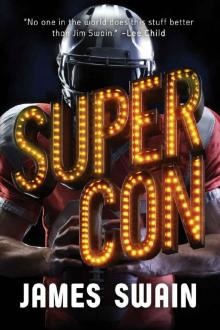 Super Con
Super Con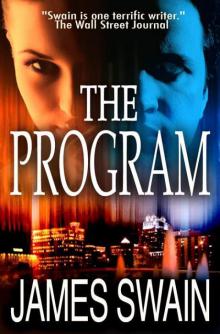 The Program
The Program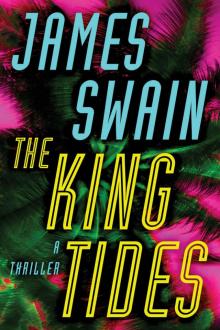 The King Tides (Lancaster & Daniels Book 1)
The King Tides (Lancaster & Daniels Book 1)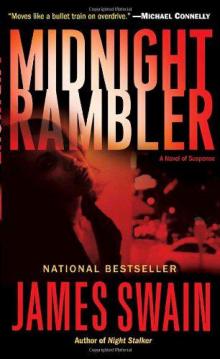 Midnight Rambler
Midnight Rambler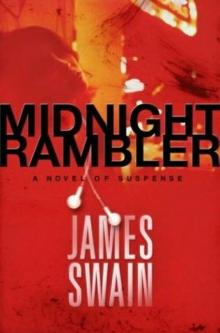 Midnight Rambler jc-1
Midnight Rambler jc-1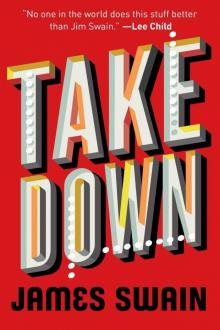 Take Down
Take Down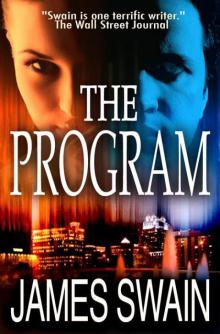 The Program (Jack Carpenter series)
The Program (Jack Carpenter series)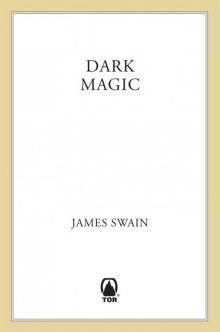 Dark Magic
Dark Magic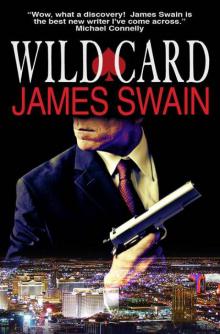 Wild Card (Tony Valentine Series)
Wild Card (Tony Valentine Series)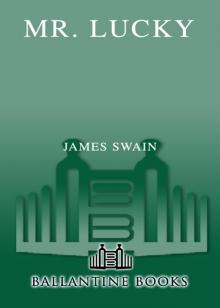 Mr. Lucky
Mr. Lucky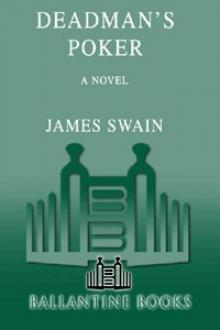 Deadman's Poker: A Novel (Tony Valentine)
Deadman's Poker: A Novel (Tony Valentine)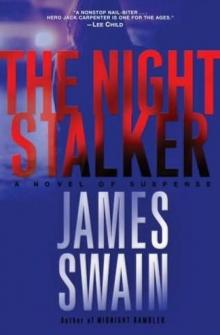 The Night Stalker jc-2
The Night Stalker jc-2 Loaded Dice tv-4
Loaded Dice tv-4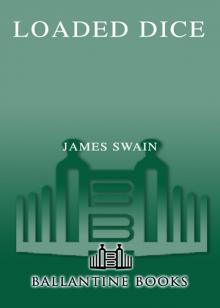 Loaded Dice
Loaded Dice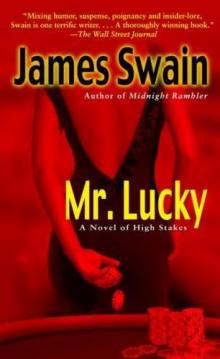 Mr. Lucky tv-5
Mr. Lucky tv-5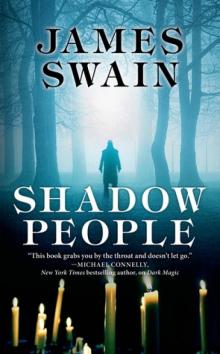 Shadow People
Shadow People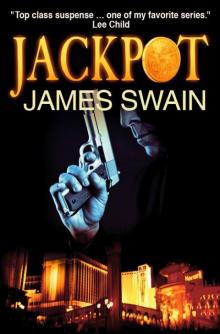 Jackpot tv-8
Jackpot tv-8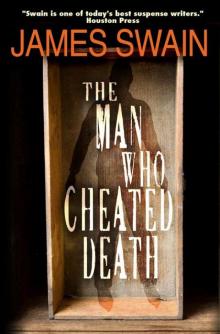 The Man Who Cheated Death (Vincent Hardare)
The Man Who Cheated Death (Vincent Hardare)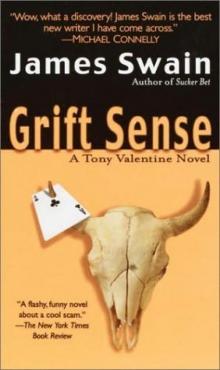 Gift sense tv-1
Gift sense tv-1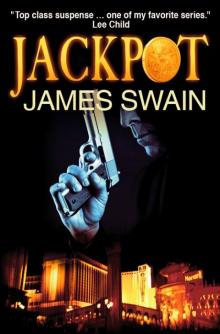 Jackpot (Tony Valentine series)
Jackpot (Tony Valentine series)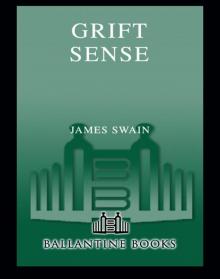 Grift Sense
Grift Sense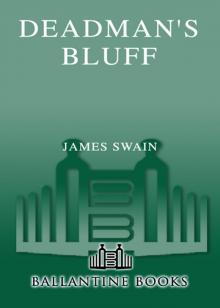 Deadman's Bluff
Deadman's Bluff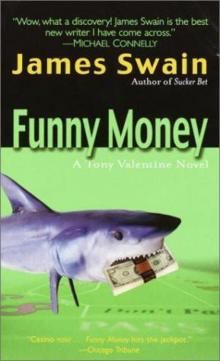 Funny Money tv-2
Funny Money tv-2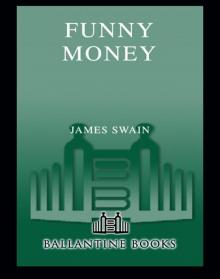 Funny Money
Funny Money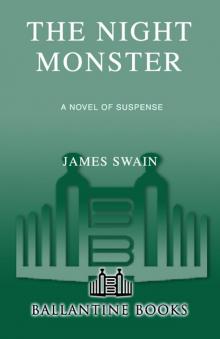 The Night Monster
The Night Monster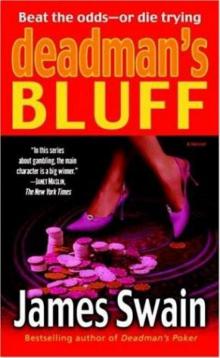 Deadman's Bluff tv-7
Deadman's Bluff tv-7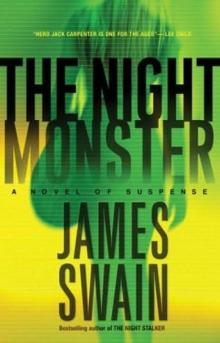 The Night Monster jc-3
The Night Monster jc-3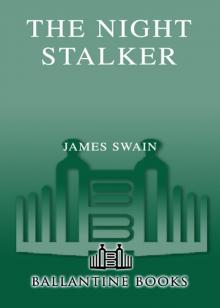 The Night Stalker
The Night Stalker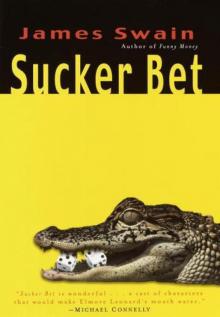 Sucker Bet tv-3
Sucker Bet tv-3